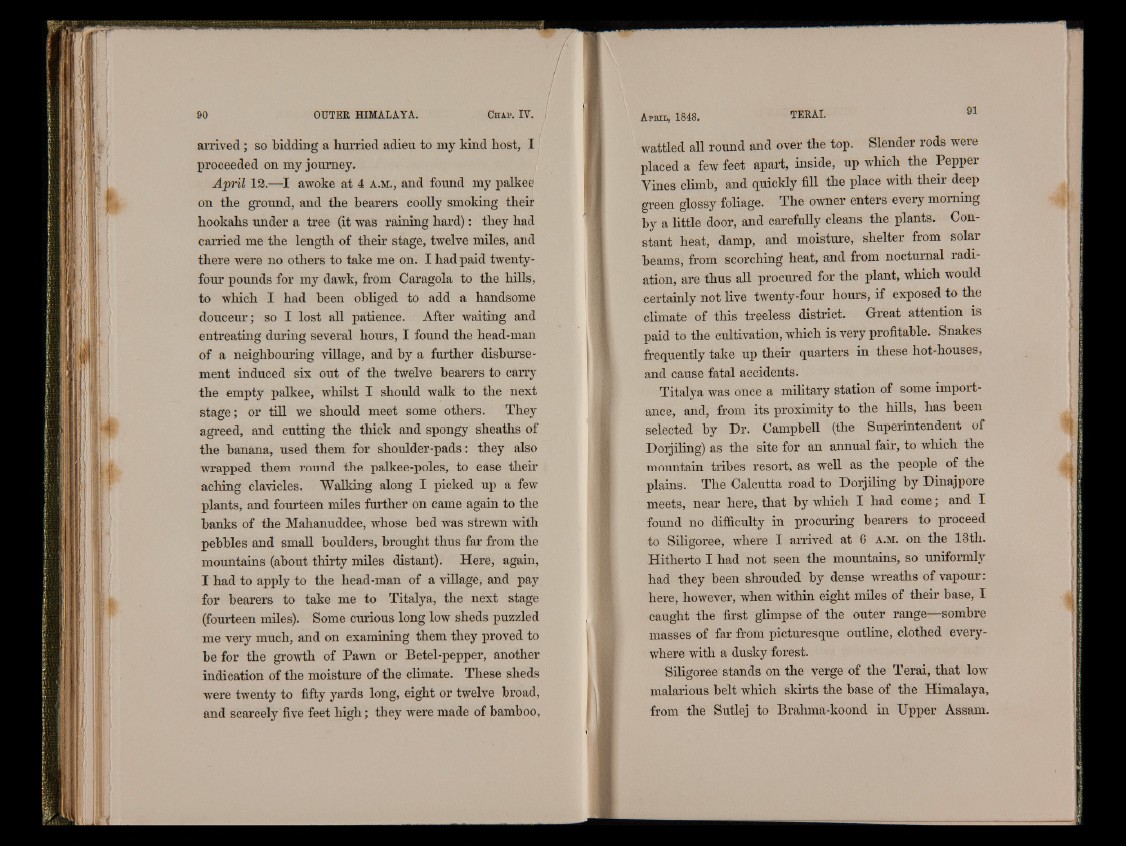
90 OUTER HIMALAYA. Chap. IY.
arrived; so bidding a hurried adieu to my kind host, I
proceeded on my journey.
April 12.—I awoke at 4 a .m., and found my palkee
on the ground, and the hearers coolly smoking their
hookahs under a tree (it was raining hard): they had
carried me the length of their stage, twelve miles, and
there were no others to take me on. I had paid twenty -
four pounds for my dawk, from Caragola to the hills,
to which I had been obliged to add a handsome
douceur; so I lost all patience. After waiting and
entreating during several hours, I found the head-man
of a neighbouring village, and by a further disbursement
induced six out of the twelve bearers to carry
the empty palkee, whilst I should walk to the next
stage; or till we should meet some others. They
agreed, and cutting the thick and spongy sheaths of
the banana, used them for shoulder-pads: they also
wrapped them round the palkee-poles, to ease their
aching clavicles. Walking along I picked up a few
plants, and fourteen miles further on came again to the
banks of the Mahanuddee, whose bed was strewn with
pebbles and small boulders, brought thus far from the
mountains (about thirty miles distant). Here, again,
I had to apply to the head-man of a village, and pay
for bearers to take me to Titalya, the next stage
(fourteen miles). Some curious long low sheds puzzled
me very much, and on examining them they proved to
be for the growth of Pawn or Betel-pepper, another
indication of the moisture of the climate. These sheds
were twenty to fifty yards long, eight or twelve broad,
and scarcely five feet high; they were made of bamboo,
April, 1848. TERAI. 91
wattled all round and over the top. Slender rods were
placed a few feet apart, inside, up which the Pepper
Vines climb, and quickly fill the place with their deep
green glossy foliage. The owner enters every morning
by a little door, and carefully cleans the plants. Constant
heat, damp, and moisture, shelter from solar
beams, from scorching heat, and from nocturnal radiation,
are thus all procured for the plant, which would
certainly not live twenty-four hours, if exposed to the
climate of this treeless district. Great attention is
paid to the cultivation, which is very profitable. Snakes
frequently take up their quarters in these hot-houses,
and cause fatal accidents.
Titalya was once a military station of some importance,
and, from its proximity to the hills, has been
selected by Dr. Campbell (the Superintendent of
Doijiling) as the site for an annual fair, to which the
mountain tribes resort, as well as the people of the
plains. The Calcutta road to Dorjiling by Dinajpore
meets, near here, that by which I had come; and I
found no difficulty in procuring bearers to proceed
to Siligoree, where I arrived at 6 a .m . on the 13th.
Hitherto I had not seen the mountains, so uniformly
had they been shrouded by dense wreaths of vapour:
here, however, when within eight miles of their base, I
caught the first glimpse of the outer range—sombre
masses of far from picturesque outline, clothed everywhere
with a dusky forest.
Siligoree stands on the verge of the Terai, that lowr
malarious belt which skirts the base of the Himalaya,
from the Sutlej to Brahma-koond in Upper Assam.